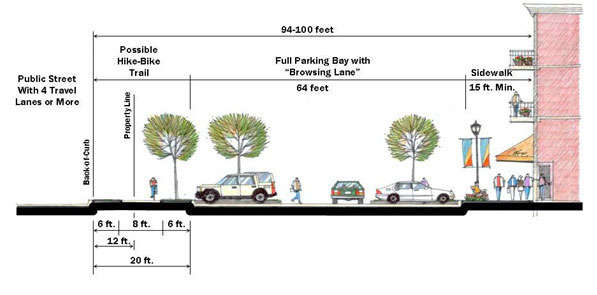Driven by New Urbanism, more than two dozen communities in the U.S. have loosened zoning restrictions in recent years. Cities are opting to use form-based codes, a concept less concerned with the use of buildings and more with their appearance and the way they relate to each other.
The goal of city planners is to shape the streetscape according to a vision for a neighborhood. The new approach has been called “performance-based zoning.” An example is a large development in Fremont, Calif., where the city council changed its approach to zoning on a nearly 900-acre development adjacent to a light rail station.
Planners started with several goals—a certain number of jobs, a certain number of homes including affordable homes, and strict standards for a low carbon footprint. The developers were allowed to design the project as they saw fit as long as they could achieve those goals.
The performance-based approach is contrary to the principle of separation of uses that led to color-coded zoning maps pinned up in most town halls. According to the old philosophy, ach zone had its own designated use: residential, commercial, or industrial. This method is increasingly seen as inappropriate for urban development—especially infill, downtown, and transit-oriented projects.
(http://www.citylab.com/housing/2014/08/braving-the-new-world-of-performance-based-zoning/375926/)
Related Stories
Codes and Standards | Jun 22, 2021
Actually, few companies plan to significantly reduce their office footprint
CBRE survey shows that many firms will continue with hybrid work.
Codes and Standards | Jun 21, 2021
Vancouver, B.C., may delay new zero emissions building standards
Building permit delays may postpone new standards by a year.
Codes and Standards | Jun 17, 2021
Buffalo’s parking reform having noticeable impact on development
Elimination of mandatory parking allotments encourages new projects.
Codes and Standards | Jun 16, 2021
Inconsistent building codes make some states more vulnerable to hurricanes
Florida takes top spot for strongest building code in latest IBHS survey.
Codes and Standards | Jun 15, 2021
Growing housing supply gap will worsen affordability crisis
Supply projected to fall 4.5 million units short in 2022.
Codes and Standards | Jun 15, 2021
Florida will allow virtual inspections, building code enforcement, permit issuance
New law will go into effect on July 1, 2021.
Codes and Standards | Jun 10, 2021
New York City cracks down on construction site safety
Buildings Dept. issues new safety legislation for City Council consideration.
Codes and Standards | Jun 9, 2021
ASHRAE updates health care facility ventilation standard
Includes improved guidance on thermal comfort, revisions to air filtration requirements.
Codes and Standards | Jun 8, 2021
American Wood Council releases new fire design specification
For design of wood members, assemblies, and connections to meet code requirements.
Codes and Standards | Jun 7, 2021
Guide provides strategies to overcome barriers to sustainable affordable housing
International Living Future Institute document helps with social, regulatory, and financial hurdles.

















